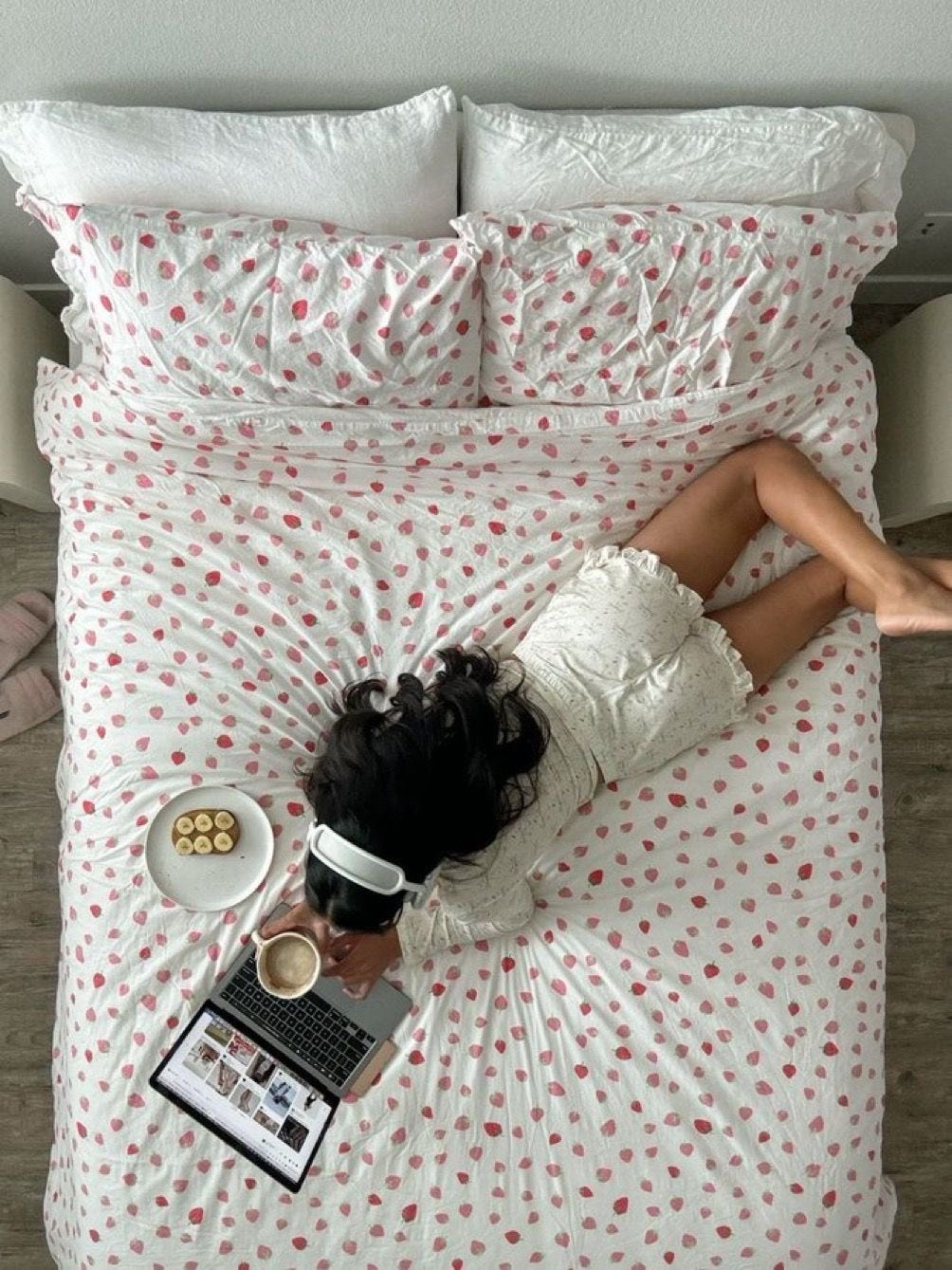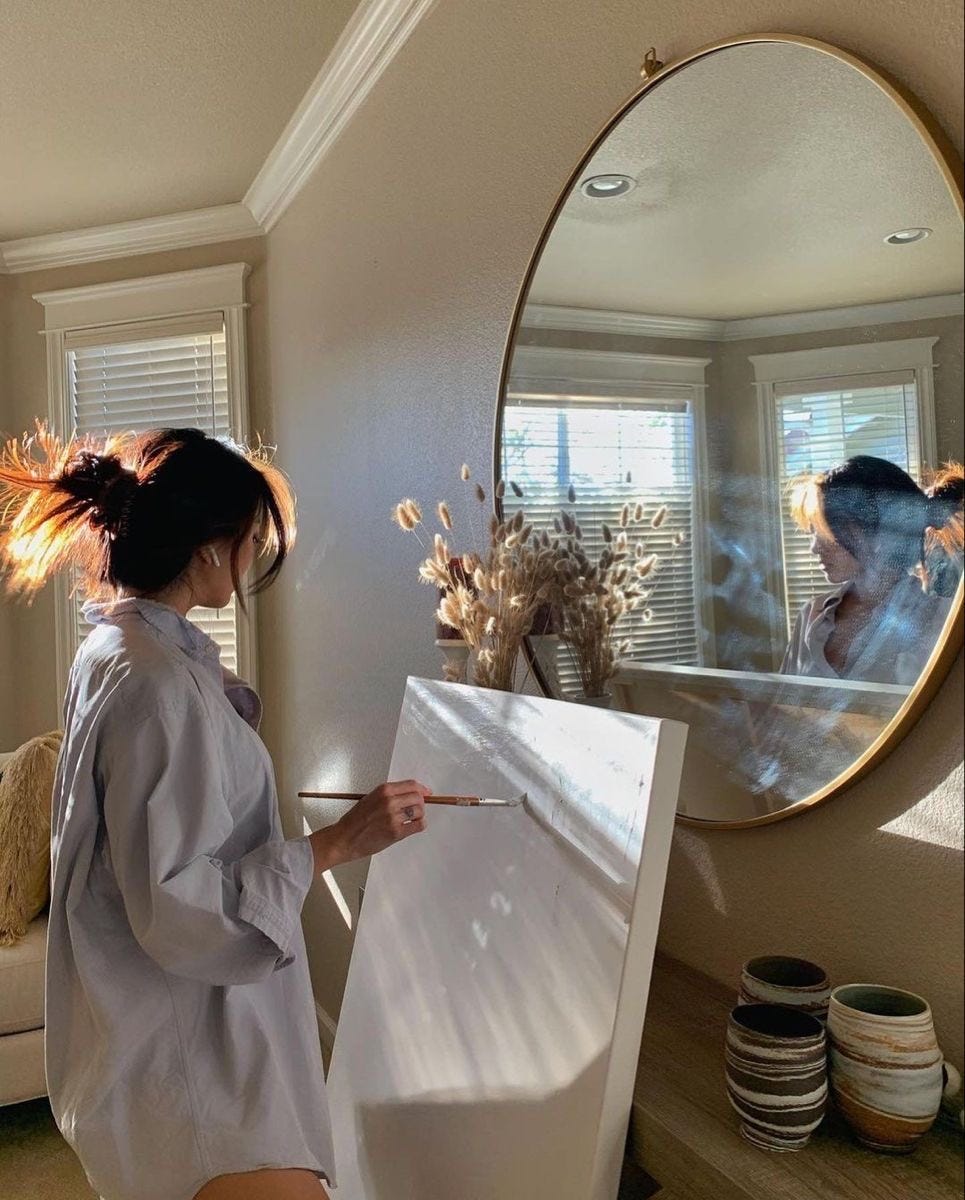it’s always during the final few hours of a weekend—usually on a sunday around 5:42 p.m.—that i remember i am, in fact, a person who loves going out. not all the time, but in theory. and in brief, curated intervals.
in that moment, i will suddenly want to be surrounded by friends in a candlelit restaurant, laughing at something vaguely ironic, wearing lipstick i haven’t worn in months. but also, simultaneously, i’ll want to be exactly where i am: wrapped in a fleece blanket that has definitely seen better days, eating pasta out of a bowl the size of a small child, texting someone “we should catch up soon” with absolutely no plans to follow through.
this, right here, is what i’ve come to call the homebody paradox.
it’s the feeling of loving your own space so much it becomes an identity—your bubble, your sanctuary, your safe little world—but still finding yourself romanticizing the version of you that would go out more, say yes more, meet people more, live more. it’s not that you don’t want to leave your home. it’s that you want to miss your home while you’re out.
this contradiction used to confuse me. how could someone be so deeply comforted by solitude and yet crave the novelty, spontaneity, and light chaos of life outside their four walls? how can we both desire stillness and stimulation, quiet and connection, routine and reinvention?
maybe this is the side effect of building a life that feels too good inside. when you’ve worked hard to make your home warm and slow and soft—a space that feels like you—it becomes harder to justify stepping outside of it for anything less than magic. but magic, as we know, is inconsistent. and people, as we know, are sometimes exhausting.
still, there’s a longing. a restlessness that arrives uninvited.
the homebody paradox is this: we crave comfort and connection in the same breath. we spend so long building inner worlds we adore and then wonder why we sometimes feel slightly invisible in them.
we say “i love my own company” and mean it, but also whisper into the void hoping someone will say, “but i’d still love to be in your company too.”
in our digital age, home has become something between a sanctuary and a performance. we no longer just live in our homes—we curate them, share them, aestheticize them. we see homes on pinterest that look like sanctuaries and we try to recreate that feeling in the corners of our rooms. handmade mugs, thrifted bookshelves, mood lighting that whispers “this person has taste but also inner peace.”
but what do we do with the stillness once we have it?
what no one talks about is how even the most beautiful solitude can become heavy. even the quietest lives have moments of noise inside them. and even when the world inside our homes is curated and soft and safe—there are hours that stretch a little too long. there are evenings where you start to wonder whether you’ve built a home or a hiding place.
that’s the paradox.
i’ve come to realize that being a homebody is not a personality type—it’s a sensitivity to the outside world. it’s knowing that the volume out there is too high, and that peace isn’t just nice—it’s necessary. but even in this peace, we sometimes ache. not loudly. not in a way that disrupts the softness. but in a way that asks: am i missing something?
and then we scroll. we watch people dancing at parties and laughing at brunch and twirling in dresses we can’t imagine wearing without feeling overdressed in our own lives. and for a moment, the candle on our nightstand feels like a poor substitute for whatever is happening out there.
but here’s where it gets more complicated: when we finally do go out, when we dress up and make plans and lean into the extroverted version of ourselves—we miss home immediately. we miss the quiet of our own thoughts, the freedom to step away from conversation, the gentle rhythm of our familiar rituals. we miss our bed. our playlist. our silence.
this longing for both is not indecision. it’s just honesty.
the homebody paradox is also emotional. we want to be seen—but on our terms. we want connection—but without the overstimulation. we want intimacy—but in soft lighting, with people who understand the art of quiet companionship.
we don’t want to be alone. but we want to be left alone. there’s a difference.
i think about this a lot when i reread passages from rainer maria rilke or annie dillard or even durga chew-bose—writers who have shaped their worlds through intense inwardness. people who understand the architecture of stillness. people who write about the inside as if it were the main event.
rilke famously wrote, “i want to be with those who know secret things or else alone.” that line feels like the anthem of every homebody who has ever sat in a room full of noise and thought, i’d rather be in my own silence than in someone else’s chaos.
but being a homebody also requires discipline. because if we’re not careful, comfort becomes avoidance. solitude becomes silence. peace becomes invisibility. we can start to use our homes as shields, not sanctuaries. we can build lives so protected they forget how to be lived.
and so the work is to be aware. to know the difference between restoration and hiding. to ask ourselves: am i choosing this, or defaulting to it? am i safe here, or am i just scared out there?
because the homebody paradox isn’t a problem to be solved. it’s a life to be balanced. it’s the art of loving your inner world while still letting the outer world reach you. it’s learning how to sit with yourself and also open your door. it’s keeping the candle lit—and letting others see the light.
i think the most powerful homebodies are the ones who choose their solitude consciously. who don’t apologize for their quiet joy but also don’t pretend they never ache for closeness. the ones who know how to be still but still say yes to life. the ones who leave the door cracked open—not for escape, but for breath.
so no, we’re not indecisive. we’re not antisocial. we’re not boring.
we’re just homebodies. thoughtful, romantic, overly sensitive, chronically observant creatures who find love in light patterns on walls and joy in the way our books lean against each other. who feel deeply when we get dressed for an event and even more deeply when we cancel it last-minute and exhale into our couch.
we’re people who understand that home isn’t just a place. it’s a rhythm. it’s a language. it’s a relationship.
and sometimes, paradoxically, it’s the one place where we both disappear and come alive.










I am in awe of your writing and your wisdom and this piece may be my favourite yet. This resonated so much with me and I feel that you have so eloquently explained what it means to be an introvert while capturing so much more. I’m going to save this and share it with the people close to me to help them understand me because you have put into words that which I have never quite managed to explain about myself. Thank you!
This is my truth. Glennon Doyle talks about making sure your present self doesn't make plans your future self won't want to do. I find it so hard to know when I will want to put on my lipstick and when I will miss my house.